2019 Session Accomplishments with Representative Rick Roth
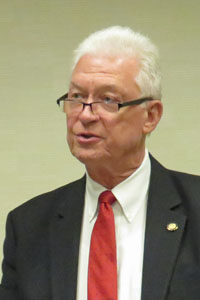
Our May meeting featured HD85 Representative Rick Roth, who described some of the significant actions taken by the Florida Legislature in the just completed session.
- The House passed a parental notification act for abortions by minors, but it was not passed by the Senate.
- Felon voting rights re-instatement (from 2018 amendment 4) was clarified to state that all aspects of a sentence must be concluded (including restitution if applicable)
- Smokeable marijuana is no longer prohibited for medical use with a doctor’s letter
- Texting while driving is now a ‘primary offense’ meaning you can be stopped for it (Emily Slosberg’s crusade)
- The “Certificate of Need” requirement for expansion of medical facilities was eliminated
- Coverage of 21 types of cancer are now covered under firefighter health plans
- HB7113 transportation bill authorizes 3 regional corridors to be built
- The Parkland bill that allows for the arming of teachers (with board approval) passed
- The “assignment of benefits” to rebuilding contractors was limited and polices can be written to preclude it
- The “sanctuary cities” bill (SB168) passed, allowing for the fining of local governments who do not cooperate with federal immigration authorities
For more detail on the major bills from this session, see:
2019 Legislative Session Update
Please join us next month on June 26 for the awarding of our annual Anne Roberts Scholarships. The presenter will be former Congressman and Senior Fellow at the Lemieux Center for Public Policy, Tom Rooney.
NCNC – Imparting Local Knowledge for 10 years
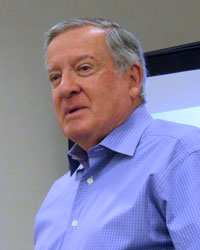
Our April meeting featured Sal Faso, President of the North County Neighborhood Coalition.
Started by a small group of concerned residents 10 years ago, NCNC has grown to encompass 23 Communities and Condo/Homeowners Associations in the North County, with 45,000 residents and 30.000 voters. With a mission to “improve the quality of life for residents in North Palm Beach County”, NCNC operates by educating its members on the local issues that affect them, and by making government accessible by hosting meetings with local officials.
As a non-partisan group, Sal and the NCNC have hosted candidate forums for county and municipal races, and their monthly meetings are well-attended by candidates running for offices at all levels. With a 76% average voter turnout by NCNC community members (compared to 60% county wide), candidates ignore NCNC at their peril.
Sal and his team advocate for many local issues affecting residents, including safety and security, economic prosperity, the character of the area, financial accountability of government, and maintaining home rule.
For more information on the NCNC, or to get your community involved, check out their website at: http://www.ncncpbc.org/
Everglade’s Foundation’s Erik Eikenberg Discusses Water Projects
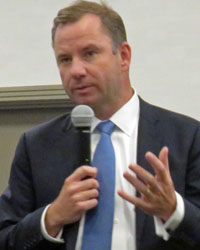
A design element of the Comprehensive Everglades Restoration Plan (CERP), authorized by Congress in 2000, is a reservoir south of Lake Okeechobee referred to as the Everglades Agricultural Area (EAA) reservoir. Currently a key feature of proposed solutions to the toxic algae problems plaguing the estuaries on both coasts, it would allow the diversion of Lake outflows away from the Caloosahatchee and St. Lucie rivers, and help restore the flow of fresh water through the Everglades to Florida Bay.
Erik Eikenberg, who heads the influential Everglades Foundation, presented a hopeful outlook for the project as we now have in Governor DeSantis someone who can potentially make it happen.
A Marjorie Stoneman Douglas High School graduate, he recalled the influence of that school’s namesake on him. (Douglas, the author of “River of Grass” in 1947, helped redefine the popular conception of the Everglades as a treasured river instead of a worthless swamp.) Long a player in Florida Republican politics, he was an intern for Congressman Clay Shaw, who authored the CERP, and saw the introduction of the snout beetle into the ecosystem to manage the proliferation of the invasive Australian Melaleuca. Chief of staff for Governor Charlie Crist, he also worked for former Governor Bob Martinez.
Water is a “unifying issue”, he said, as many of us depend on the Everglades for our water supply. West Palm Beach, for example, depends on the Grassy Waters Preserve. The toxic blue-green algae (also known as cyanobacteria), is a health issue, and threatens the use of our waterways and hence the tourism economy of the state.
Governor DeSantis campaigned on fixing the problem, and is supported by Congressman Brian Mast (who is the Governor’s point man on the issue). The Governor’s recently released state budget includes $625M for the project in addition to expected federal funds. One significant roadblock of course is the decision by the South Florida Water Management District (SFWMD) to extend the Florida Crystals lease on the EAA land for another 8 years. This was done without public notice and several days before the Governor’s inauguration, in spite of an impassioned plea by Brian Mast to delay it. In an unprecedented move, DeSantis then demanded (and got) the resignation of the entire SFWMD board.
Time will tell how this plays out, but it is a hopeful sign that President Trump will be visiting the Lake to review related projects (such as dike repairs) on Friday of this week. The Governor’s good relationship with the President should be helpful in moving this project along.
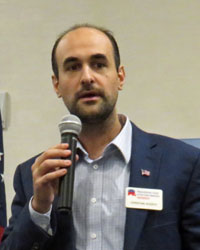
Also at the meeting was CD21 candidate Christian Acosta who has announced his exploratory quest to unseat Congresswoman Lois Frankel in 2020. This D+17 seat was uncontested in 2018, allowing the incumbent to remain in office without campaigning for the privilege. Stretching along the coast from Singer Island through Delray Beach and encompassing most of the county south of Southern Boulevard, including Wellington, it deserves a Republican challenger.
Christian is a resident of Boynton Beach and teaches Electric Power Engineering at Palm Beach State. A nuclear engineer and Pittsburg transplant, Christian has been making the rounds of the Republican clubs and plans to introduce himself at the Trump-45 Club next month.
Next month, please join us on April 24 for Sal Faso, President of the North County Neighborhood Coalition.
Representative Mike Caruso Describes the Recount Circus
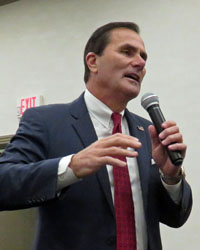
Our February lunch featured FH89 Representative Mike Caruso.
With the nickname “landslide” in Tallahasee, given his 37 vote winning margin, Mike relayed some of the arduous steps involved in moving through the circus that was Susan Bucher’s election operation.
Although he admits he very much enjoys the work of the capital, he may have thought twice about running if he knew what was in store for him. The coastal district, held for the last 8 years by Bill Hagar, was described to him as an easy Republican win when he decided to run. “Easy” is relative of course as the district is actually only R+1.6, practically even.
The campaign was dirty, with opponents stealing signs, lots of nasty lies spread in mailers, etc., but the worst was to occur after election day.
FH89 was one of the four races that were close enough to trigger a recount, and Mike witnessed first hand all the corrupt practices that were on display at the Supervisor of Elections. Many of us who were involved in the process were aware that there was no transparency, and that communications from Susan Bucher’s office were few, misleading and probably not true.
What you may not have known about though, was the gobs of ballots that were being “found” after the counting was supposed to be done – over 4000 in the case of FH89. Mike’s opponent Jim Bonfiglio was heard to say at one point during the recount “don’t worry, we will have the votes”. Bucher was never able to actually say how many votes had actually been cast in any of the races, yet she seemed to always know the margins.
Lots of dirty tricks were occurring. SOE employees were observed in a backroom hurriedly filling out new ballots – supposedly transcribing “unreadable” ones but who could tell – no one was allowed in there and the canvassing board was not present in violation of law. When this activity was challenged, the supervisor’s response was to move filing cabinets around to block the view of the activity from the “public”. When the canvassing board was present and involved in “determining the intent of the voter”, Mike was keeping count of how many votes were being assigned to him and his opponent. At the end of the day though, when the tallies were supposedly “rolled up”, his count never changed. This occurred multiple times.
The most arrogant action by Bucher though was about toilets. With hundreds of volunteers from both parties descending on the Riviera Beach counting facility, there was only one bathroom and she refused to remedy the situation as she really didn’t want to make it pleasant for those looking over her shoulder. Mike requested from the Republicans in Tallahassee assistance in obtaining porta-johns and toilet paper, and when they came through, Bucher refused to place them on “her” property and said she would have them towed if placed on the street.
Fortunately, when the race was finally certified, Mike was ahead by the same 37 votes he had been from the start and his opponent conceded. Although the entire experience was an unpleasant one, he has taken his place in the Legislature, and through the actions of Governor DeSantis, we have a new Supervisor of Elections.
PLF’s Mark Miller at January Lunch

This month’s speaker was Mark Miller, Senior Attorney of Pacific Legal Foundation, one of the most active and effective public interest legal organizations in the US. Founded during the Reagan years, PLF has tallied up an impressive set of victories in high profile cases, including 11 wins at the Supreme Court. A 501(c)3 organization, PLF is supported by grants and donations and does all its work pro-bono.
Mark specializes in environmental law, land use and first amendment cases, and he described for us many of his projects that have been covered by the national media.
In his recent Supreme court case, Weyerhaeuser vs. US Fish and Wildlife, Mark successfully argued that restricting land use in Louisiana as habitat for the “Mississippi Dusky Gopher Frog”, an amphibian that has not been found there in decades, was a mis-application of the Endangered Species Act. In an 8-0 decision (Cavenaugh had not yet been confirmed), SCOTUS overturned both the district court and the 5th circuit who had maintained that Fish & Wildlife had ‘agency discretion’ to so designate.
Another case Mark explained was Knick v. Township of Scott, in which a Pennsylvania property owner challenged a recent town ordinance that required public access to her property which was alleged after an intrusive search, to contain graves. With an argument that this was in violation of the 4th (unrestrained search) and 5th (unlawful taking) amendments, PLF argued at the Supreme Court recently that the case should not have to exhaust all remedies at the state level prior to argument in federal court. This case, argued this month, is pending.
Another high profile PLF Supreme Court case was Minnesota Voters Alliance v. Mansky, in which voters who wore clothing containing political sentiments were denied access to the polling places. A tea party “Don’t tread on me” slogan was at issue. The Court issued its ruling on June 14, 2018, stating in a 7–2 decision that Minnesota’s law did violate the First Amendment, ruling it unconstitutional.
Mark has also been involved in state and local cases. In 2014 he represented the owner of the Crafted Keg brew pub in Stuart, who wanted to sell beer in industry standard “growlers” (64 ounce containers) in violation of a Florida law which protects large beer makers from upstart craft brewers. This one received national attention. “Why should his success be limited by a state law that’s irrational?”, Mark argued. After suing the state, this one was resolved in the Legislature where the 64 oz. growler was legalized.
He also volunteered to represent JP Krause, a Vero Beach High School student whose election to student body President was dis-allowed by the school over a “build a wall’ joke he made during the campaign. He was re-instated after the story was picked up by Fox & Friends and Whoopi Goldberg supported the student’s position on “The View”.
After the meeting, in preparation of a full page ad in the Lincoln Day Dinner booklet, the club leaders were photographed with our new club banner:
 From left: Claire Jones, Fred Scheibl, Carol Hurst, Fran Hancock, Bette Anne Starkey, Virginia Brooks
From left: Claire Jones, Fred Scheibl, Carol Hurst, Fran Hancock, Bette Anne Starkey, Virginia BrooksCharles Bender and Monique McCall at December Lunch
Our annual Christmas lunch this year featured Place of Hope CEO Charles Bender and local vocalist Monique McCall.
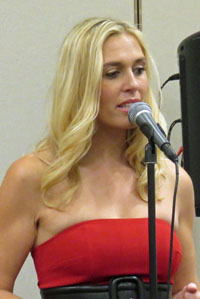
With a beautiful rendition of “O Holy Night”, Monique got us started, and later ended the meeting with more seasonal fare including her own composition “Everyday is Christmas”. She has performed this song on local radio, and has also recorded “Feel Like Florida” an outstanding boost for the Sunshine State.
Charles, one of the founders of his organization “Place of Hope”, gave us an overview of current operations.
When you think of the leadership at many charitable organizations, you don’t immediately think “Republican”, but Charles defies the stereotype. To drive that point home, he showed off his white “Trump Socks”, a positive sign indeed. He has been in the business for many years and goes way back with our club President Fran Hancock. As the DeSantis organization finds it feet in Tallahassee, Charles will be there as part of the transition team.

Place of Hope is in the group foster home business – they take the really tough cases of kids who have been severely abused and may have had multiple placements in foster care. Many are rescued from sex traffickers at a young age. By the time they are referred by the Florida Department of Children and Families, they are typically in desperate straits as DCF will not remove a child from their parents lightly.
The approach taken at the five Place of Hope facilities is to “parent” the kids, and teach personal responsibility and independent living skills. They also try to keep sibling groups together if at all possible. When a child “ages out” at 18, they do what they can to get them set up in an environment that will help them be successful, and in their years of operations, they have had 300 adoptions.
For more information about Place of Hope or to make a donation, please visit their website at https://www.placeofhope.com. They currently have a 4-star rating with Charity Navigator, with 86% of their $7.6M in annual revenue going to program expenses.
Next month, please join us on Wednesday January 23 for Mark Miller of Pacific Legal Foundation. Mark will share his interesting perspectives from arguing cases in front of the Supreme Court and will tell us about his recent 8-0 victory in Weyerhauser vs U.S. Fish & Wildlife Service”, (aka the “dusky gopher frog” case) which protected the rights of a Louisiana property owner against the “critical habitat” designation of the Endangered Species Act.
Thoughts on the Election with Sid Dinerstein
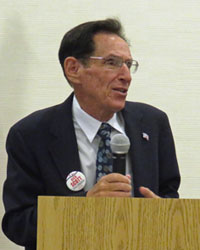
When we first booked Sid Dinerstein for his “after-election, looking-forward” thoughts, our current electoral chaos was not anticipated. With four races still in flux eight days after the election, we still don’t know with certainty where we will be when the dust settles, but Sid did have some encouraging words for us.
Starting with the fact that the military ballots (which lean considerably Republican) have not yet been tallied, and that recounts rarely if ever move votes in any substantive way, he opined that DeSantis and Scott will likely prevail. With the current 5,000 vote deficit, it does not look as good for Matt Caldwell. It is clear that the Supervisors of Election in Broward and Palm Beach must be replaced before the next election, and we need to work towards that end.
On a national level, losing the House was not a desired outcome, but it has interesting ramifications for 2020. Gridlock will ensue, not some Progressive tsunami. Sid believes we will have no immigration reform and no wall, but with an expanded majority in the Senate we will have judges. When President Trump is done he will have appointed fully 1/3 of federal bench. Deregulation is likely to continue (it doesn’t need Congress), as will trade negotiations, and the economy will continue its good performance. With the expectation that House Democrats will be out to torture Trump with endless investigations and impeachment, something even most Democrats are not asking for, a big 2020 sweep for the President is likely.
On the state level, Rick DeSantis origins in the Freedom Caucus bode well for no tax increases, more school choice, continued growth in population and tourism, a low crime rate, and no Medicaid expansion – a complete opposite of what a Governor Gillum would have sought. We will continue what Sid sees as the “Golden Age of Florida.’ And lest we forget, we will have 3 new conservative justices on the Florida Supreme Court in January.
Overall, not a bad outlook!
Sid was introduced by current GOP Chair Michael Barnett who calls Sid his mentor. Michael also asked for volunteers to help with the “count watching” at SOE as the hand recounts begin shortly. We also had at the meeting victorious State Representatives Rick Roth (HD85), Mary Lynn Magar (HD82), and Michael Caruso who is currently ahead by 37 votes in HD89, and Palm Beach Gardens Councilman Matthew Lane.
Please join us on Wednesday, December 19 for Charles Bender, Executive Director of the Place of Hope who will give us an update on their activities, and we will also have a little holiday music.
Ballot Amendments Explained
On October 24, our RCPB lunch consisted of a ballot tutorial by Fred Scheibl. Pointing out that the consequences of passage for many of these amendments are subtle, we heard an argument that the “picks” by various groups (including the RPOF) may be missing some key information.
In particular, it was pointed out that:
- Amendment 1 is touted as a tax cut, but in reality it will shift a tax burden from homestead property to business and rental property when localities raise their millage to counter the drop in revenue.
- If Amendment 2 does not pass and the cap on non-homestead property is allowed to expire on January 1, we will see an effective tax increase in the range of $700M next year.
- Amendment 3 does not provide “voter control of gambling”, it just limits who can put such a measure on the ballot and deprives the Legislature of their power to regulate.
- Amendment 6, in attempting to create additional “rights” for victims, actually compromises the constitutional rights of defendants for a fair trial and will significantly complicate the operation of criminal trials.
The following was provided as a handout at the meeting and may be useful in understanding the implications of the amendments. The boxes in the second column show the preference of RPOF, Trump Club 45, Florida TaxWatch, the Palm Beach Post, and the Sun Sentinel. Green is YES, Red is NO.
| Ballot | Others | My Pick | Rationale | Your Pick ? | |||||
|---|---|---|---|---|---|---|---|---|---|
 #1 – Increased Homestead Property Tax Exemption |
|
NO | Since taxing authorities will simply raise millage to make up for the $600M shortfall, the net effect is to shift a tax burden from homesteaders to businesses and vacation property. Counties and municipalities have booked plans to raise their rates if this passes. Commercial, rental and vacation property owners would see a tax increase on passage, as will homestead owners who fall don’t qualify for the additonal exemption (< $100K) | ||||||
 #2 – Limitations on Property Tax Assessments |
|
YES | This simply makes permanent something we have had for 10 years and is set to expire on January 1. If it doesn’t pass, an estimated $700M new taxes will be immediately imposed on non-homestead property owners since their assessed values (20% or more below market value) would immediately rise to market value next year. | ||||||
 #3 – Voter Control of Gambling in Florida |
|
NO | If passed, would make it very difficult to challenge the Seminole monopoly on gambling and places wrongful restrictions on the legislative body. It doesn’t give voters more control, it just limits who is permitted to put a gambling referendum on the ballot. This would be the first such restraint on the freedom of action by the Legislature, and would be a dangerous precedent. | ||||||
 #4 – Voting Restoration Amendment |
|
NO | There is already a process for a felon to get their voting rights restored after a waiting period, and it requires the felon to ask for it, rather than being an automatic action. Passage could potentially add 10% to the voting population at a single point in time, much larger than the margin of error in recent statewide elections. No one knows how such a large voting block would act, but Democrats believe it will favor them and thus support it overwhelmingly. | ||||||
 #5 – Supermajority to impose / authorize / raise state taxes |
|
YES | Anything that makes it harder to raise taxes is a good thing. Andrew Gillum’s plan for increasing taxes would be stymied if this passes and he is fighting hard to defeat it. Support and opposition to this amendment is largely along party lines. | ||||||
 #6 – Rights of Crime Victims, Judges |
|
NO | This amendment increases the rights of victims at the expense of the rights of the accused, and it tampers with the judicial process for criminal trials. It would tie the hands of defense attorneys regarding the timing of hearings, and could require criminal defendents to pay restitution to victims. The criminal justice system arbitrates between the charges brought by the state (who must prove guilt) and the accused who defends against the charges. It is not meant to be a means for victims to extract restitution or revenge, or to inject themselves into the process. That activity belongs in the civil courts. If passed this Would make for VERY BAD law. Passage would also let judges stay on the bench another 5 years (to age 75), and prohibit courts from deferring to the rulings of state agencies (aka the Chevron Doctrine.) | ||||||
 #7 – First Responder / Military survivor benefits, colleges |
|
NO | Creates another unfunded mandate on local governments who would be required to pay the benefits to local first responders, and adds bureaucracy to the management of colleges and universities. The current organizational structure of the college system would be enshrined in the constitution, making it much harder to change if needed. | ||||||
 #9 – Prohibits offshore drilling, indoor vaping |
|
NO | A prohibition on offshore drilling should not be in the constitution. We elect legislators to make these kind of decisions. Removes the Legislature’s control of energy development, limiting future opportunities for tapping oil and gas reserves. Attempts to treat vaping the same as smoking cigarettes, an unproven assertion. | ||||||
 #10- State and Local Government Structure / Operation |
|
NO | This amendment would force the eight counties who currently have appointed officials to create elected constitutional offices. This weakens the “home rule” ability of local governments. Our county already has constitutional elected officials, but some would argue appointing them would be an improvement, particularly with the Sheriff. Other provisions establish executive departments that need not be in the constitution, and constrains the Legislative calendar. | ||||||
 #11- Property Rights, cleanup, criminal statutes |
|
YES | This will provide flexibility to affect those sentenced under laws that are being repealed, and otherwise cleans up some obsolete sections of the constitution. | ||||||
 #12- Lobbying and Abuse by Public Officers |
|
NO | The 2 year restriction already in law is sufficient – most states have similar ethics laws but none goes beyond 2 years. This amendment would leave too much of the details of the proposal to others (Ethics Commission), such as defining what is a “disproportionate interest”. Should be a matter for legislation, not the constitution. | ||||||
 #13- Ends Dog Racing |
|
NO | This seeks to eliminate existing businesses and would likely result in a move away from pari-mutual betting to card rooms and slots at existing facilities. Some believe the “humane treatment” language is a trojan horse leading to other restrictions on the treatment of animals (limit hunting for example). | ||||||
 County #1- School Tax increase |
|
NO | The PBC school district just got a 10 year windfall with the sales tax increase. They need to make do with the money they have. According to WJNO’s Brian Mudd, we have the highest per-student spending in the state (over $15K) – much more than even Broward or Miami Dade. |
| Some additional Resources: | |
|---|---|
| Our 2018 Amendments Analysis: | https://gopclubpb.org/2018-election/2018-ballot-questions/ |
| TaxWatch Voter’s Guide: | http://www.floridataxwatch.org/library/2018voterguide |
What is the Constitutional Revision Commission (CRC) ?
The Constitution Revision Commission (CRC) convenes once every 20 years to examine the Florida Constitution and propose changes for voter consideration. Created by Article XI, Section 2 of the Florida Constitution, the CRC is composed of 37 Commissioners. Fifteen Commissioners are appointed by the Governor of Florida, nine by the President of the Florida Senate, nine by the Speaker of the Florida House of Representatives and three by the Chief Justice of the Florida Supreme Court. The Attorney General of Florida automatically serves on the CRC. The Governor designates the Chair of the CRC.
The CRC meets for approximately one year, traveling across the State of Florida, identifying issues, performing research and possibly recommending changes to the Florida Constitution. As part of this process, the CRC holds public hearings to learn about issues that matter most to Floridians and considers proposed constitutional amendments submitted by the public. Any proposals that pass the CRC’s final vote would be placed on Florida’s General Election ballot (November 6, 2018) and must secure at least 60 percent voter approval to become law.
The 2017-2018 Constitution Revision Commission (CRC) was the third of its kind in Florida history.
In 1968, Florida voters passed an amendment requiring a CRC every 20 years.
The 1977-1978 CRC placed eight amendments on the ballot and none passed.
The 1997-1998 CRC placed nine amendments on the ballot for and 8 were passed.
The 2017-2018 CRC held 15 public hearings across the state. It adjourned on May 11, 2018, and compressed 905 individual proposals into 8 complex amendments.
The 37 commissioners were chaired by businessman and former Senate candidate Carlos Beruff who ran against Marco Rubio in the 2016 primary. Also on the commission were Pam Bondi (AG is always a member), State Representative and Lt. Governor candidate Jeanette Nunez, FL Senate candidate Belinda Keiser, and former Senate President Don Gaetz.
The commission considered 123 commissioner proposals and 782 from the public, adopting 25 which were packed into the 8 ballot questions.
Scott Maxwell on the Importance of Poll Watchers
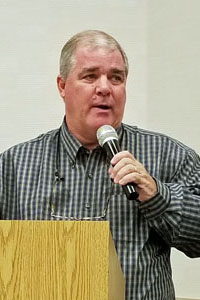
With the election less than 6 weeks away, the county party wants a lot more volunteers to man the polling stations, both as poll watchers and to wave signs at the early voting locations. That was the main message from Executive Director Scott Maxwell on Wednesday.
Scott wants to physically cover all 14 of the early voting locations with a unified Republican presence. Unlike the limited hours during the primary, the EV sites will be open fully 7AM to 7PM.
Poll watcher classes have already started so the time to sign up is now. To illustrate the importance of that job, Scott told us the story of the rampant voter fraud that had been perpetrated in his city of Lake Worth before he was elected to the City Commission, and how effective poll watchers put an end to it.
This is story I had never heard before, and as a current poll worker, I was skeptical that it could happen with our stringent processes on checking voter identification. As we heard though, with an inside job performed by criminal poll workers, anything is possible. Poll watchers are our only line of defense against it.
Here is Scott’s story:
In a convoluted scheme perpetrated by a coterie of far left activists, their teams went door to door seeking out those who had not voted lately, with the intention of identifying those who had died or moved away, but were still on the rolls. They then ran multiple candidates for each of the city commission seats to split the vote enough to force a runoff. When the runoff occurred, other volunteers flooded the polling places claiming to be those voters they had previously tagged as no longer eligible but still on the rolls. Since this can only work with the cooperation of the poll workers in the targeted precincts whose job it is to verify identity, it was accomplished by packing the precincts with poll workers who were part of the conspiracy.
Scott had always wondered why seemingly fringe candidates were winning these elections, and was able to ferret out how they were doing it by analyzing the voter history data for the main and runoff elections. The fix was simple – put poll watchers in the precincts to watch what was happening and prevent the fraud from taking place. This worked, Scott and other non-fringe candidates began winning elections, and the corruption has been stopped.
The evidence of collusion on the part of the poll workers was taken to the State’s Attorney and the Supervisor of Elections. Unfortunately though, time went by and ultimately the statute of limitations had passed and no prosecutions for voter fraud occurred.
So, become a poll watcher for November and help insure a fair and open election.
Next month, join us on October 24 for a discussion of constitutional amendments you are being asked to approve. The large number of complex ballot questions to appear in November require research to really understand the consequences of their passage. Let us help you through it with a distillation of the important issues and some recommendations on how to approach them. See who put the questions on the ballot, who supports them and who opposes them. You will come away enlightened!
August Lunch Features Array of Primary Candidates
Six days before the election, our candidate roundup had a pretty good lineup, including 4 who are running in state-wide races.
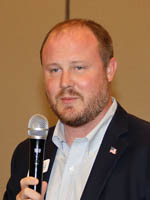
Matt Caldwell
For the position of Agriculture Commissioner, Fort Myers resident Matt Caldwell made his pitch. Currently the State Representative for district 79 (Lee County), Matt spoke of his priorities of “Jobs, water and the second amendment”, and his NRA endorsement. The club has hosted competing candidates Denise Grimsley and Baxter Troutman over the last couple of months.
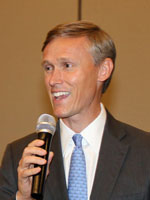
Frank White
For Attorney General, panhandle resident Frank White spoke of his promise to “defend the constitution”. Protecting the second amendment, prosecuting fraud, and using the 10th amendment to fight back against federal programs like Obamacare are his priorities. Frank’s campaign against Judge Ashley Moody (who many of us met at the Jamboree) has turned nasty, with an increasingly strident level of negative ads.
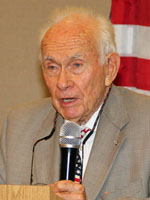
Gene Badger
Representing the Adam Putnam campaign for Governor, we heard from Florida Agricultural Hall of Famer Gene Badger, who made the case for Adam as a businessman for Governor. This was surprising since Adam Putnam has spent most of his adult life as an elected official (8 years as Ag Commissioner, 10 years in Congress, 4 years in the Florida House). Adam was the youngest House member in 1996 at the age of 22, and the youngest member of Congress at 26.
Other Governor candidates were in attendance, including Miami resident John Mercadante and Melbourne resident Bob White.
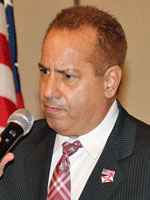
John Mercadante
Mr. Mercadante, who describes himself as “quite a piece of work”, believes the second amendment is “chiseled in stone”. Regarding the Parkland shooting, he believes the answer lies in bomb sniffing dogs, and banning children’s backpacks.
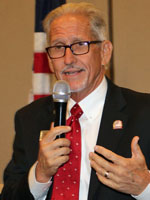
Bob White
Mr. White, who calls himself the “outsider candidate” is the chairman of the Republican Liberty Caucus of Florida (RLCFL). His issues are 2nd amendment related (open carry, campus carry), and he opposed the MSDHS Public Safety Act.
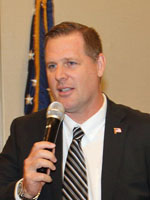
Dave Cummings
The only federal office candidate we had was Dave Cummings for Congressional district 18. With the theme “All is Vanity”, Dave spoke philosophy rather than policy. Challenging incumbent Brian Mast, he believes he has better answers than Brian on the algae issues and the second amendment.
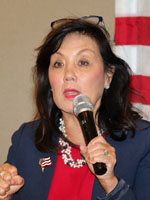
Belinda Keiser
For the Florida Senate district 25, Belinda Keiser spoke of “faith, family, and the love of country.” She is interested in implementing e-verify in Florida, and outlawing sanctuary cities. Belinda is facing Gayle Harrell to fill the seat vacated by Joe Negron.
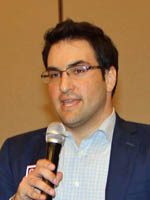
Matt Spritz
Farther south in House District 89 to replace term limited Bill Hager, we heard from Matt Spritz and Mike Caruso.
Mr. Spritz spoke of his extensive public policy experience as legislative aid to representative Bob Rommel (Naples). He described a long list of endorsements by public officials.
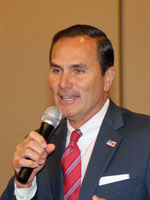
Mike Caruso
Mr. Caruso, a CPA, is focused on education (“stop testing so much”), and ending sanctuary cities.
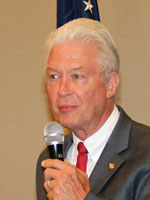
Rick Roth
Also speaking was one candidate on the November ballot but not in the primary – HD85 representative Rick Roth. Describing President Trump as an “Evangelical Populist”, he speculated on a possible “red wave” in the fall. For that to happen though, we need to get out there and talk to the NPAs, convincing them to vote for Republicans.
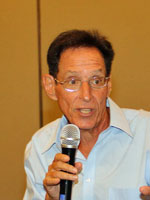
Sid Dinerstein
Finally, we heard from Sid Dinerstein on the Palm Beach Gardens ballot questions. Sid, a key player in getting term limits passed in 2014, spoke of the attempts by the current council to weaken them. “The good news is that all five on the Council in 2014 are now gone; the bad news is the people on the Council that replaced them…”. The city was sued (by Sid and others) to invalidate the 4 charter questions on the March ballot, and 2 were thrown out. A third is being challenged on appeal. On the August ballot, the two that were thrown out have come back with different wording but the city is running a campaign designed to mislead the voters. Sid urges Gardens residents to vote NO, NO, NO on the three questions.
Thanks to Carol Porter for the candidate photos.
